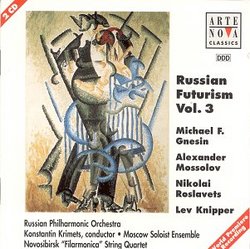| All Artists: Gnesin, Mossolov, Roslavets Title: Russian Futurism Vol. 3 Members Wishing: 0 Total Copies: 0 Label: Arte Nova Records Release Date: 6/16/1998 Genre: Classical Styles: Chamber Music, Symphonies Number of Discs: 2 SwapaCD Credits: 2 UPC: 743214872222 |
Search - Gnesin, Mossolov, Roslavets :: Russian Futurism Vol. 3
 | Gnesin, Mossolov, Roslavets Russian Futurism Vol. 3 Genre: Classical
|
Larger Image |
CD Details |
CD ReviewsNot what Futurism means and not convincing genres scarecrow | Chicago, Illinois United States | 08/16/2000 (3 out of 5 stars) "Whether the Russian composers who roughly lived the beginning decades of the 20th Century harbored an affinity with Futurism as that which emanated from Fascist Italy is a point of contention.Luigi Russolo, and Marinetti was fascinated by noises(musique concrete),unmusical timbres produced by homemade instruments predating wonderfully the liberation of sound ushered in by Edgar Varese a little later in the Thirties. And Varese was much more vigorous in the means and ends he achieved,actually writing out scores and fashioning an impressive comprehensive musical language something the Italian Futurists never completed with any degree of sophistication or conviction. Their futurist content was more an addendum to the wider political sphere of Mussolini's Italy under the retrogressive monarchy of King Emmanuel.The Russian composers exhibited on this disk I think had a more private introspective musical language, one more attuned with a brief retrogressive look into the colours and gestures of their cultural heritage,Jewish,Ukrainian and Russian.However the genre of the quartet is the wrong place to appraise their music. Mosolov did write impressive pieces which made reference to the new reality of industrialization(largely the Zhadnov cultural turn under Stalin),the myth and power of machines. He also has a piano solo modestly entitled "Rails" revealing a simple rhythmic motoric drive which pays homage to this new power. This First Quartet has a deep brooding grotesque at times drama to it. The moments are deeply disturbing trangressing between melodic repose to tension-ladened jabs,stabs and thrusts of repeated rhythms. The first movement alone is a 15 minute dramatic act, and easily can encompass a structure for an entire work,with three more movements to live through.Nikolai Roslavets had sympathies with the 1917 Revolution,and he had a vision that the advancements of his musical language would have some degree of resonance within the social and political advancements of Lenin's coup d'etat. But the rigours of the musical Roslavets had envisioned, a form of dodecaphonic thinking,was placed far from the Bolshevik agenda, having to wait indefinitely. Experimental Russian musical culture is still waiting in many respects. And again here the genre of the string quartet is the wrong place to encounter the originality of Roslavet's vigorous music,more the piano solos should be encountered first. This quartet is indeed tame by comparison with a deep melodic content however with some coloristic display,but nothing unusual,nothing revealing his original voice of dodecaphonic thinking. Lev Knipper as well shows a somewhat advanced musical language.After a time of hibernation he finally made a career for himself as conductor in Iran throughout this period. The Gnessin is quite impressive pieces(an entire disk here) based on Jewish popular images revealing a good melodic sense flowing,on-going rhythms,but I take issue as whether this music has any affinity with Futurism by any definition."
|

 Track Listings (12) - Disc #1
Track Listings (12) - Disc #1